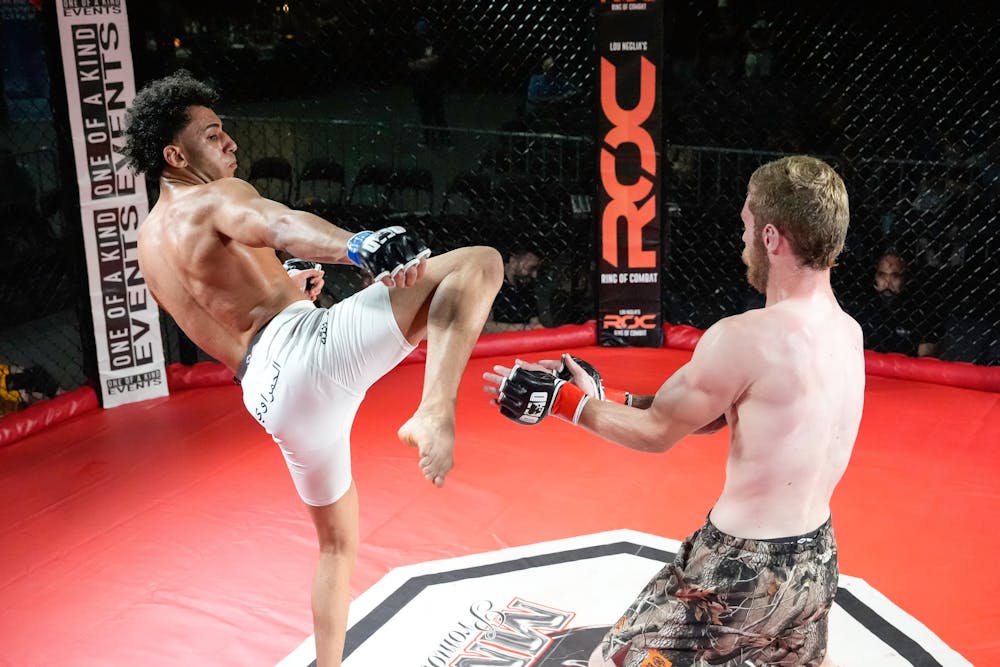With the UFC’s massive growth in popularity over the last decade, combat sports have amassed many misconceptions about them: some believe that fighters are inherently “violent” or “not all there” mentally, and that the sport itself is “barbaric.”
But Ramy Alhamrawy, a senior biology major at Seton Hall, is here to disprove these misconceptions—and with the insight and experience to do so.
“It's not like that at all,” Alhamrawy said, addressing these common misconceptions. “Most people who train are normal and just really competitive and passionate about the sport.”
“It’s not just a sport where you’re trying to knock the other guy out like most people think—there’s a lot more strategy to it,” he added. “When you watch the UFC, [for example], all you see is guys fighting each other, but there’s weeks of preparation and strategy that they do before the fight to figure out the best way to beat their opponent.”
Born and raised in Scotch Plains, a small town just 15 miles from SHU, Alhamrawy has been passionate about combat sports for several years now. A seasoned grappler and amateur mixed martial arts (MMA) fighter with a record of 2-1-0, he trains regularly at GTGym, a privately owned warehouse-turned-gym in Linden.
But long before he was passionate about combat sports, Alhamrawy’s parents signed him up for karate and taekwondo as a kid—something he didn’t appreciate at the time nearly as much as he does now.
“I didn’t really enjoy it at first,” he said. “I was stubborn and just didn’t put as much effort into it as I probably should have.”
He eventually moved on and started playing other sports like baseball, basketball, and soccer while still in middle school. Later, though, as a student at Union Catholic High School, he developed a newfound interest in combat sports and decided to give it another try—this time in the form of Brazilian jiu-jitsu (BJJ).
“My interest just kept growing over time, and it became an obsession in the best way possible,” Alhamrawy said.
In 2021, Alhamrawy joined his first BJJ-based gym, B-Team Jiu Jitsu, located near his home in Greenbrook. Originally developed for battlefield and self-defense scenarios during Japan’s feudal period, BJJ is an offshoot of traditional Japanese “jujitsu,” which focuses on ground fighting (or “grappling”) and submission techniques. In recent years, BJJ has experienced a rise in popularity in the US as an entry point to combat sports due to the concurrent growth in American UFC viewership.
Alhamrawy has since become a seasoned grappler. With B-Team Jiu Jitsu, he has competed in several high-level tournaments, including the Finishers Submission Only Open in Bethlehem, Pennsylvania, the Hammer Challenge Series, also in Pennsylvania, the ADCC Open in Atlantic City, and the Men of War Grappling Open in Freehold twice.
More recently, Alhhamrawy has made the transition from BJJ to MMA to expand his skillset further. Rather than strictly grappling, MMA is a culmination of different martial arts and disciplines, BJJ among them.
After initially doing boxing and kickboxing with his BJJ coach, Alhamrawy joined Odyssey MMA to pursue MMA. However, because he was accustomed to grappling, his standing hand-to-hand combat, or his “striking” ability, presented a challenge to his transition to MMA.
To address this weakness, Alhamrawy and his then-teammates went to Weapons 9, a Muay Thai gym in Dunellen, where they could improve their striking by training with coaches who specialized in it.
“Striking was definitely a weakness of mine going into my first fight,” he said. “But I was able to improve drastically in a short amount of time just by going to a striking-based gym, and actually learning the art of striking from experts on it.”
Known as the “Art of Eight Limbs,” Muay Thai is a striking-based martial art that teaches fighters to incorporate their elbows, knees, and shins into their hand-to-hand combat (hence, “eight limbs”).
His decision to learn Muay Thai and improve his striking paid off: although he lost his first fight in 2024, Alhamrawy has won his last two consecutive fights—with his most recent in June of this year being the proudest moment of his combat sports career so far.
“The guy I fought was heavily favored. It was in his hometown [Poughkeepsie, New York] he had all of his friends and family there. I didn’t really have anybody there, but I still came out with the win,” he said. “So I was just super proud of that.”
Although it was just his third fight, Alhamrawy was dominant: after three lopsided rounds, he defeated his opponent via unanimous decision. This was a much different result than the fight that preceded it, in which Alhamrawy defeated his opponent—also heavily favored—via armbar submission after two back-and-forth rounds.
A quality that has helped him in his last fight and in his combat sports career thus far is his competitiveness. It would be an understatement to say Alhamrawy is competitive—in fact, he is so competitive that even the idea of losing itself bothers him to his core, he said.
“I’m the type of guy who just hates losing,” Alhamrawy said. “Sometimes I'll imagine myself losing, or I’ll dream of myself losing, and it really bugs me.”
Alhamrawy uses this hatred for and discomfort with losing as motivation, saying that it is actually what motivates him more than anything else.
“When I’m preparing for a match or fight, and I think of losing, it just makes me want to work even more and even harder,” he added. “It makes me think that my opponent might be training harder than me, so I just use that as fuel to get even better.”
In concert with this motivation, Alhamrawy also draws inspiration from fighters in the UFC, especially those from the Republic of Dagestan in southwest Russia. This includes Khabib Nurmagomedov, who Alhamrawy considers the greatest UFC fighter of all time, and Islam Makhachev, the second-best pound-for-pound fighter in the UFC at the time of this article.
What Alhamrawy and others admire about these Dagestani fighters is the reputation they have built over the years. It is one of hard work and dedication, but also a sense of humility—whereas other UFC stars enjoy the spotlight and “punking” their opponents, fighters from Dagestan are typically humble and respectful in and outside the octagon, even while collectively dominating the sport.
“They’re very dedicated to working hard and taking care of their families—and I feel like that’s how it should be,” Alhamrawy said. “And the way they respect everybody, and how they’re not arrogant or cocky even though they know that they're the best in the world, I think is really cool as well.”
Reflecting on his journey in combat sports thus far, Alhamrawy can express nothing but gratitude.
“It honestly has changed my life so much,” he said. “It has taught me discipline, how to eat right, to avoid drugs and alcohol, take care of my body, take my recovery seriously. It just has been so beneficial.”
Looking ahead, Alhamrawy sees himself competing in the sport for as long as he can and doing something combat-sports related later in his life.
“I definitely could see myself coaching, or starting a team or gym when I’m older,” he said. “Or maybe I’ll try to go pro—but I definitely need more time.”
As he said, Alhamrawy is focused on gaining as much experience as possible before he even considers the next level. He is hopeful that his next opportunity to do so will be in December or January, with his next MMA fight likely taking place then, preceded by a six-to-eight-week training camp beforehand.
Alhamrawy has returned to the misconceptions he sought to disprove—this time, by focusing on one about himself. Although he is passionate about combat sports like BJJ and MMA, and trains regularly, Alhamrawy insists that he does not see himself as better than anyone else because of it, as people might assume.
“Even though I might come off as some ‘tough guy,’ or like I don’t want to talk to anyone, that's not the type of person that I am at all,” Alhamrawy said. “If you get to know me, you’ll see that I'm outgoing and not someone who walks around like they own the place.”
Zachary Mawby is a friend and roommate of Ramy Alhamrawy.
Zachary Mawby is the head editor for The Setonian’s Sports section. He can be reached at zachary.mawby@student.shu.edu.





